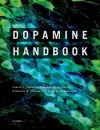
Dopamine Handbook
4 authors - Hardback
£155.00
Anders Björklund is Senior Professor of neuroscience at Lund University (Sweden). His research career at Lund University spans over more than 50 years, and has resulted in a publication list that covers over 600 papers. His major achievements are in the field of cell transplantation and brain repair. He started this line of research in the mid 1970ies, based on the idea that immature neurons can be used to restore brain circuitry and promote functional recovery in animal models of neurodegenerative diseases. During this period, 1975-1985, his group pioneered this approach using cells obtained from the fetal brain. Anders and his clinical collaborators obtained permission to use tissue from aborted human fetuses in a series of open-label clinical trials in PD patients. Although the outcome of these trials has been quite variable, they have given proof-of-principle that immature dopamin neurons can survive and mature in the striatum in advanced PD patients, and restore dopamine neurotransmission in the area of the striatum re-innervated by the grafted neurons. Since the 1980ies the Lund neural transplantation program has been a leader in the development of restorative therapies in Parkinson´s disease. Current efforts at the Wallenberg Neuroscience center are focused on the development of stem cell-derived dopamine neurons for transplantation, aimed at the development of transplantable neurons derived from human pluripotent stem cells for clinical application. In a parallel line of work Anders group has explored the use of viral vector-mediated gene transfer for neuroprotection and brain repair, with the aim to develop new therapeutic approaches for Parkinson´s disease and other neurodegenerative disorders. In addition, he has pioneered the use of AAV vectors for overexpression of human ?-synuclein for induction of Parkinson-like neurodegeneration in the nigrostriatal system. This approach has provided a new tool for modeling of the progressive synuclein-induced disease process in animal models of PD. Angela Cenci Nilsson (author name M. A. Cenci) is Professor of Experimental Medical Research at Lund University (Sweden) where she heads the Basal Ganglia Pathophysiology Group). The group’s research activities address the pathophysiology and pharmacology of Parkinson’s disease (PD) and L-DOPA-induced dyskinesia using a multidisciplinary and translational approach. Current projects span a large variety of topics, including synaptic dysfunctions, dopamine receptor signaling, gliovascular-neuronal interactions, and neurorestorative treatments to enhance function and plasticity in the damaged nigrostriatal pathway. Angela has a combined clinical-basic science background, having graduated in Medicine and specialized in Neurology at the University of Verona (Italy) before obtaining a PhD degree in Neurobiology at Lund University under the supervision of Prof. Anders Björklund. In 2002 Angela received a tenured appointment as Associate Professor at Lund University, which was followed by an appointment as Full Professor in 2008. Angela has pioneered the development of symptomatic models of parkinsonism and L-DOPA-induced dyskinesia in rodents, and exploited these models to discover cellular mechanisms of disease and new therapeutic approaches. For these research achievements, she has received several awards (such as, the Erik K. Fernström Award for Young Promising Investigators, the Medal of Honours for Parkinson´s Research by the Swedish Parkinson’s Disease Foundation, and a recent membership in the Royal Academy for the Natural Sciences, Medicine and Technology in Lund). Angela currently serves on the scientific advisory boards and steering committees of several national and international research organizations, including the Swedish National Microscopy Infrastructure, The Swedish Parkinson’s Research Foundation, the Swedish Brain Foundation, the International Association for Parkinsonism and Related Disorders (IAPDR), and the International Basal Ganglia Society (IBAGS).